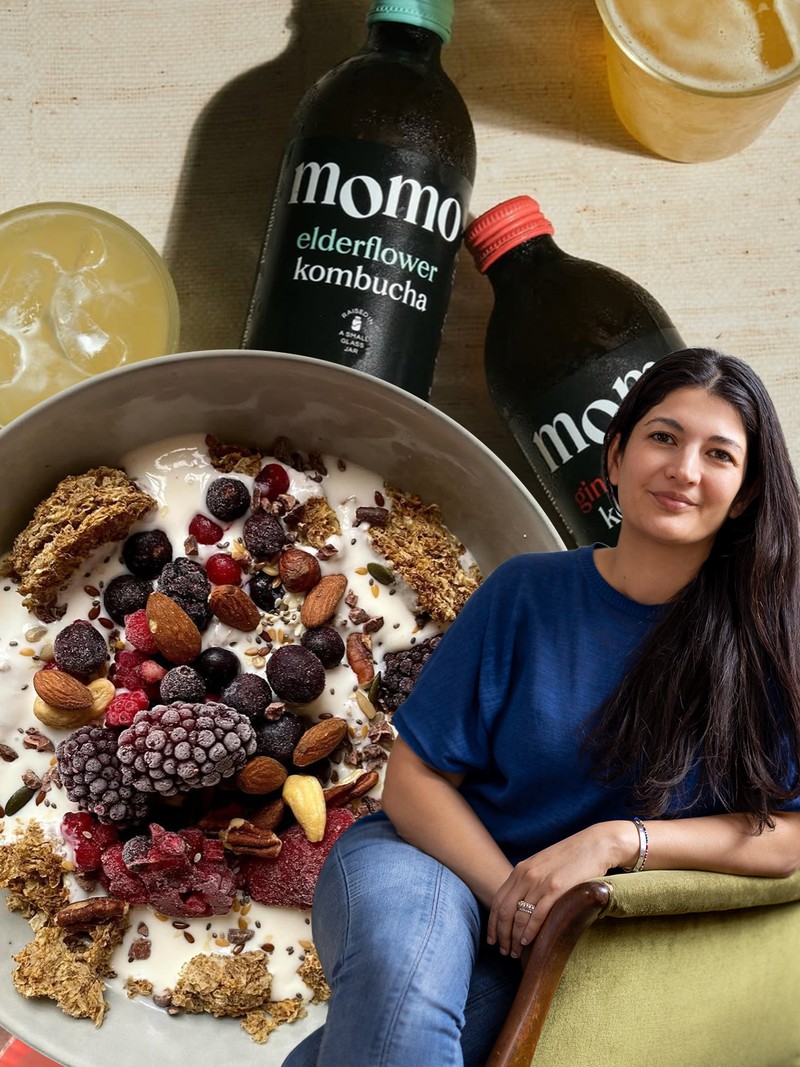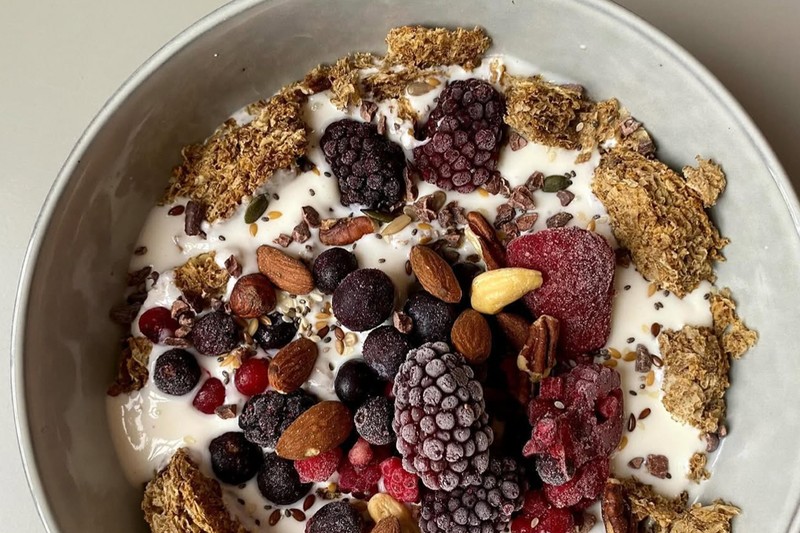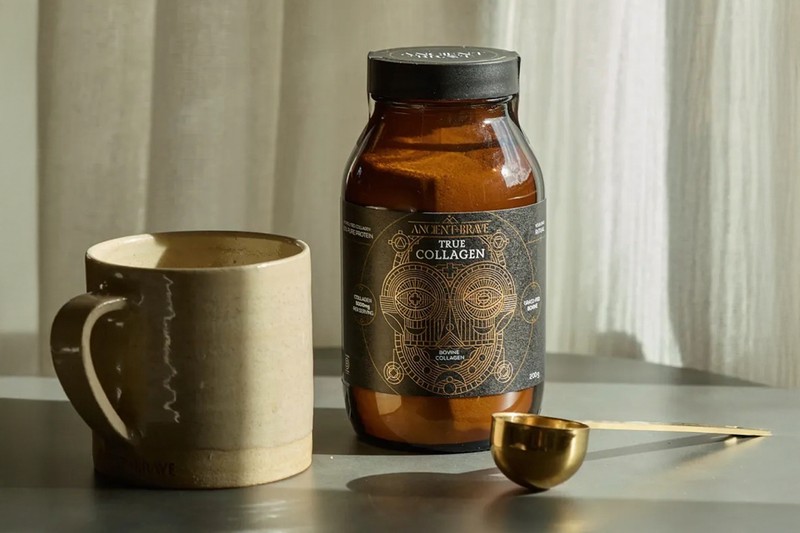
How I Keep My Gut Healthy: Farzanah Nasser
Hydration is key in the morning. We get so dehydrated overnight, so one of the first things I do when I wake up is brew a jug of nettle tea. It’s mineral rich, supports the liver, and the warmth makes it so comforting in the colder months. It also packs in some plant goodness for my gut. I try to wake up 30 minutes before the rest of the family. It gives me a quiet moment to ease into things, otherwise I feel like I’m constantly playing catch-up.
Morning movement is a great way to optimise focus. I try to get outside first thing, even if it’s only for 20 minutes. Soaking up natural light is a fantastic way to start the day. I aim for 10,000 steps a day too. Science backs it up – walking is proven to improve mood, reduce stress and anxiety, boost endorphins and increase serotonin. It also enhances blood flow to the brain, supporting focus and cognitive function. When I get back home, I jot down my to-do list. This includes my work tasks but also what I plan to eat for lunch and dinner. A few minutes of planning means I’m less likely to graze mindlessly throughout the afternoon.
A high-protein, blood sugar-balanced breakfast is a must. I’m a creature of habit when it comes to breakfast. Every morning, I have a yoghurt bowl, made with a variety of plant foods. It fuels my body, takes away the morning decision fatigue and, surprisingly, never feels boring. I start with a base of Greek yoghurt and tangy kefir, providing a double dose of probiotics for gut health. To that, I add a blend of flaxseed, shelled hempseed, chia seeds and oats, as well as almond butter and honey. This combination delivers 30g of protein and 13g of fibre, keeping me feeling full and energised for hours. I top that off with seasonal fruit – this ensures a broad spectrum of plant diversity in my diet, which is key for a healthy gut microbiome.
Golden kiwis are one of the highest sources of vitamin C. They’re my fruit of choice, though I also love berries when they’re in season. Blueberries are full of antioxidants and research suggests they can improve focus and attention. On the days I need a little more warmth, I’ll top my yoghurt bowl with stewed apples, cooked with their skin on. This gentle cooking method releases pectin, a compound with anti-inflammatory properties which can be incredibly soothing for the gut.
I drink green juice in the days running up to my cycle. I’ve been incorporating green juice into my routine for over ten years. My go-to juice includes celery, fennel, cucumber, kale, parsley, lemon and ginger. I make enough for two to three days and drink it 30 minutes before breakfast to maximise nutrient absorption. I keep the leftover fibre pulp and add it to soups and smoothies – it’s fantastic for the gut.
I focus on the three Ps at every meal: plants, protein and probiotics. I pick the protein first – fish, meat, lentils, rotating these daily – then decide on the plant-based options to go with it, and finally how to incorporate probiotics. This could be fish with veggies and kimchi; a tin of legumes over greens with a miso and apple cider vinegar dressing; or a Greek yoghurt bowl with ground flax, chia and hemp seeds.
My fridge is full of fermented foods. Staples include Raddish kimchi, Momo Kombucha, Biotiful kefir, Willy’s ACV and Clearspring miso. When buying fermented foods, make sure they’re in the refrigerated section and not on a shelf, which means they still contain plenty of live bacteria. Eating fermented foods is a simple way to improve your health, not just in the gut but throughout the body. Studies show the bacteria in kimchi can prevent the flu virus, and that eating a diet rich in fermented foods can reduce stress.
Before meals, I chew on bitter leaves. Before lunch and dinner, I have some greens or non-starchy veggies drizzled with apple cider vinegar and extra virgin olive oil. These bitter foods help stimulate digestive juices and lower the glucose spike from the rest of the meal, ensuring a more sustained energy release.
How we eat matters. Mindful eating makes a huge difference to how we digest food, increasing digestive enzymes and therefore the nutrients from the meal. I always sit down when I eat, and chew food thoroughly, aiming for 15-20 chews per mouthful. It’s also important to engage the senses. Digestion starts in the mouth, and even the aroma of food can activate digestive enzymes. Taking a couple of deep breaths before you eat also calms the nervous system.
Bolognese is a dish I make on repeat. I love it because you can easily sneak in extra goodness. Instead of using one type of onion, I opt for a trio – a red onion, a yellow onion and a shallot. This may seem like a small detail, but research shows diverse plant consumption helps feed a wider range of microbes in the gut. I always add a tin of lentils for a boost of fibre, contributing to digestive health and satiety, as well as dried shiitake mushrooms for both flavour and immune-boosting goodness, and chopped liver for a dose of nutrients.
Microwaveable rice is a great shortcut and gut hack. Pre-cooked rice like this contains resistant starch, which forms when rice is cooked and then cooled. Resistant starch is clever as it resists digestion, meaning less sugar is absorbed into your bloodstream and more stays in your gut. As a result, it has a smaller impact on blood sugar compared to freshly cooked rice. Plus, the starch left in the gut acts as food for your gut microbes, supporting a healthy microbiome.
I practise intermittent fasting. I aim for a 14 or 15-hour window of fasting daily, finishing dinner around 6pm and having breakfast around 9am. I found that my evening tiredness often led to mindless grazing, rather than actual hunger. I now stick to herbal teas after dinner and feel so much better for it.
Controversially, I don’t take probiotics all the time. However, after travelling, my gut can sometimes benefit from extra help. I find the probiotic Symprove provides that support when I need it. And while I aim to consume plenty of prebiotic-rich foods, on busy or stressful days, I add in Bodybio calcium and magnesium butyrate to my routine, and always notice a difference in how I feel.
Supplements can help fill the gaps. While a balanced diet is the cornerstone of good gut health, sometimes we need a little extra support to keep things running smoothly. Vitamin D is essential – it’s fundamental to our health. Every single cell in our bodies has a receptor for it, highlighting its critical role in both gut and immune health. In the UK, our bodies can’t produce vitamin D from sunlight between October and March, so the NHS recommends 10mcg during the winter months. That said, everyone’s needs are unique, so get your levels checked to ensure you’re supplementing appropriately with an adequate amount. I also take NAD, which plays a vital role in DNA repair, and magnesium, which is essential for calming the nervous system and involved in 500+ enzymatic reactions in the body.
Collagen is a secret weapon for the gut. I’ve been taking collagen for about ten years. I used to order it from the US before it was so readily available in the UK. I use Ancient + Brave – a hydrolysed form of collagen which is easily absorbed. I love that it’s virtually tasteless and provides a welcome boost of protein.
Go slow. Stress can be taxing on the digestive system. I love yoga and try to attend a weekly class. It calms my nervous system and reduces stress, provides sustained energy, improves focus and helps alleviate tension in my neck and shoulders. I use my Boncharge PEMF mat in the evening. It sends magnetic energy into the body, supporting cellular health, promoting healing and reducing inflammation. On the evenings I use it, I always sleep more deeply.
I’m asleep by 10pm. A good night’s sleep is a priority for me. Sleep is foundational for our health as it affects everything – from focus and energy levels to mood, food choices and even stress management and gut health. Prioritising good sleep is an investment in your health and a better tomorrow.
Visit FARZANAHNASSER.COM
DISCLAIMER: Features published by SheerLuxe are not intended to treat, diagnose, cure or prevent any disease. Always seek the advice of your GP or another qualified healthcare provider for any questions you have regarding a medical condition, and before undertaking any diet, exercise or other health-related programme.
DISCLAIMER: We endeavour to always credit the correct original source of every image we use. If you think a credit may be incorrect, please contact us at info@sheerluxe.com.



